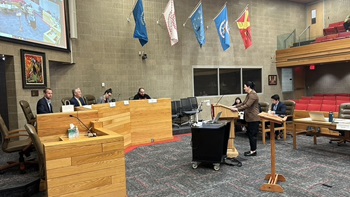USD Associate Professor Bernie Wone Receives NSF Early-concept Grant for Exploratory Research

Wone received the NSF Early Concept-grant for Exploratory Research (EAGER) for his project “EAGER: SYNPLASOMES – SYNthetic PLAnt epiSOMES for plant genome editing and engineering.”
“We are thrilled that our Synthetic Plant Episome (Synplasome) project has been awarded an NSF Early-concept Grant for Exploratory Research,” said Wone. “This funding will help us advance our research and development efforts of an efficient, persistent, self-replicating and integration-free plant genetic transformation system.”
Plant genome editing and bioengineering are crucial for understanding the genetics behind complex traits, such as drought tolerance, improving crop yield and plant structure. These technologies are essential for making crops more sustainable and productive, especially as the global population grows under climate change.
Wone’s project aims to develop unique synthetic episomal DNAs designed to be self-replicating but non-integrating into the genome of the plant cell. These synthetic DNAs can then be used for plant genome editing and bioengineering applications in plant and crop sciences.
“This advancement and application in plants could provide more efficient tools in the hands of plant researchers working on studying gene function, climate resilient crop plants, and identifying and bioengineering native candidate genes to improve yield and abiotic stress tolerance,” said Wone.
NSF EAGERs only fund high-risk, high-payoff projects that have the potential for transformative impact in broad areas of the sciences.



